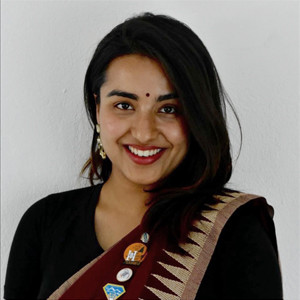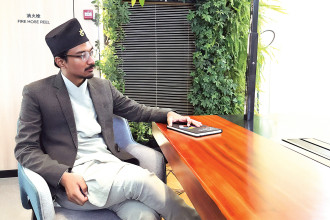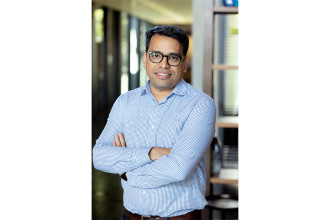-1706698081.jpg)
Pradip Khatiwada
Founder and Executive Director, Youth Innovation Lab
Pradip Khatiwada is the Founder and Executive Director of Youth Innovation Lab, a civic-tech not-for-profit company that is in mission to bridge science to people, and policy through innovation. Before founding YI-Lab, he was the National Coordinator for the National Volunteering Programme, where he managed over 5,000 volunteers in the aftermath of the 2015 earthquake. He is a key player in the technical development of the Government Nepal’s integrated disaster information management system (locally known as Bipad portal) and the official COVID-19 portal.
Khatiwada has spoken at various global platforms, including the UN General Assembly and Global Dialogues. He has also UINSPIRE Alliance as the elected chair, a global network of youth scientists from 14 countries, working on science, engineering, technology, innovation in disaster risk reduction and climate change.
Khatiwada’s interest in disaster risk reduction and technology led him to pursue his post graduate diploma from Tata Institute of Social Sciences, India in Disaster Management and Livelihood Recovery, and from Tribhuvan University in International Relations and Diplomacy. He says, “After working in technology and disaster risk reduction for many years, I realised the power of spatial data behind the volunteered geographic information that we usually call maps. That inspired me to start the concept of an innovation lab.”
In 2017, Khatiwada launched Youth Innovation Lab, which aims to bring science to people and policy through innovation. The organisation focuses on six thematic areas: digital mapping, information management system, research and publication, digital survey and mapping, training and capacity development, governance and policy.
We started this organisation to create a favourable environment for youth and young professionals to collaborate and co-create about the society, the challenges we face in everyday life, and the innovative solutions that can contribute to the inclusive development of this country. The main idea was to use technology for good.
He shares some of their achievements: "We published a book called ‘Our Female Representatives’ for the first time in Nepal, which included information about elected female representatives of 2017 election that includes profile of 14000+ female representatives of the local level, 301 female representatives of National, Provincial Assembly and Federal Parliament. The key idea of having this portal is to give digital recognition to our elected representatives and unlock informed conversation over political domain. Khatiwada led the technical team for the development of Nepal’s Integrated Disaster Information Management System, called Bipad Portal, which was initiated by the Ministry of Home Affairs, but now after the formation of the National Disaster Risk Reduction and Management Authority the portal is being managed under their leadership. It is one of the largest GIS database repositories of all kinds of disaster-related datasets in the form of maps, charts, data, etc. that the government hosts. “To make sense of these datasets, we devised the Visualisation of Risk (VisRisk) platform. This simplifies the complex geographic information with time-lapse maps to show to the local government. This innovative approach also got global recognition and we were invited to speak at different platforms about it,” he shares.
YI-Lab has also launched a platform called ‘COVID 19 monitor.net’. When the government first announced the Covid situation in Nepal, the platform was already up and running, and countries like Japan, Indonesia, Malaysia, India also used it. “We developed covid19.ndrrma.gov.np, a platform to monitor quarantine and other health infrastructures during the pandemic,” he informs. Based on our same work, later the Government requested YI-Lab to develop COVID-19 Platform to monitor quarantine, hospital and other key information.
“As the situation demanded, we shifted our focus to the ground level and partnered with the World Food Programme to map the trails and infrastructure of Dolpa and Kalikot districts,” says Khatiwada.
He says, “I am inspired by exploring local areas, getting in touch with local people and understanding their priorities in life. Being part of this tech company, my job is to communicate this scientific information to the policymakers, students and general public.”
To bridge science and the public in an innovative way, YI-Lab is currently working on creating mural art of scientific information. “We started this project from Rajapur, Bardiya where our team drew the entire VisRisk map on a school wall to help students understand how to navigate the flood risk in their area through practical visualisation of different scenarios and overall mapping,” he states, adding they also went to communities to bring complex scientific information to the household level. “We received a global resiliency award for this project,” he says.
“We also run a fellowship programme that places young engineering graduates in different municipalities,” he shares, adding the fellows work with local government officials to develop policies, guidelines and data collection methods. This fellowship programme has been implemented in more than 70+ local governments.
Regarding the operation of YI-Lab, Khatiwada says they have a core team of GIS, Technical team, Design and Project implementation team. “Our approach is driven by the Research and Development department. Unlike many institutions that focus only on product development, we invest a lot of time in research and development. This makes us different from others,” he says.
“Initially, the biggest challenge was trust. When I had long hair and a beard, many people judged my idea based on my appearance. Working on innovation is tough in Nepal as many reputed leaders have dismissed the idea that we wanted to work on,” he says.
Khatiwada says he is happy to have brought a lot of positive changes in the data world. “The datasets that we have worked on are a valuable resource for the government. If you need to do a post disaster needs assessment and need quick datasets, we have established datasets of multiple hazards in many places,” he states.






